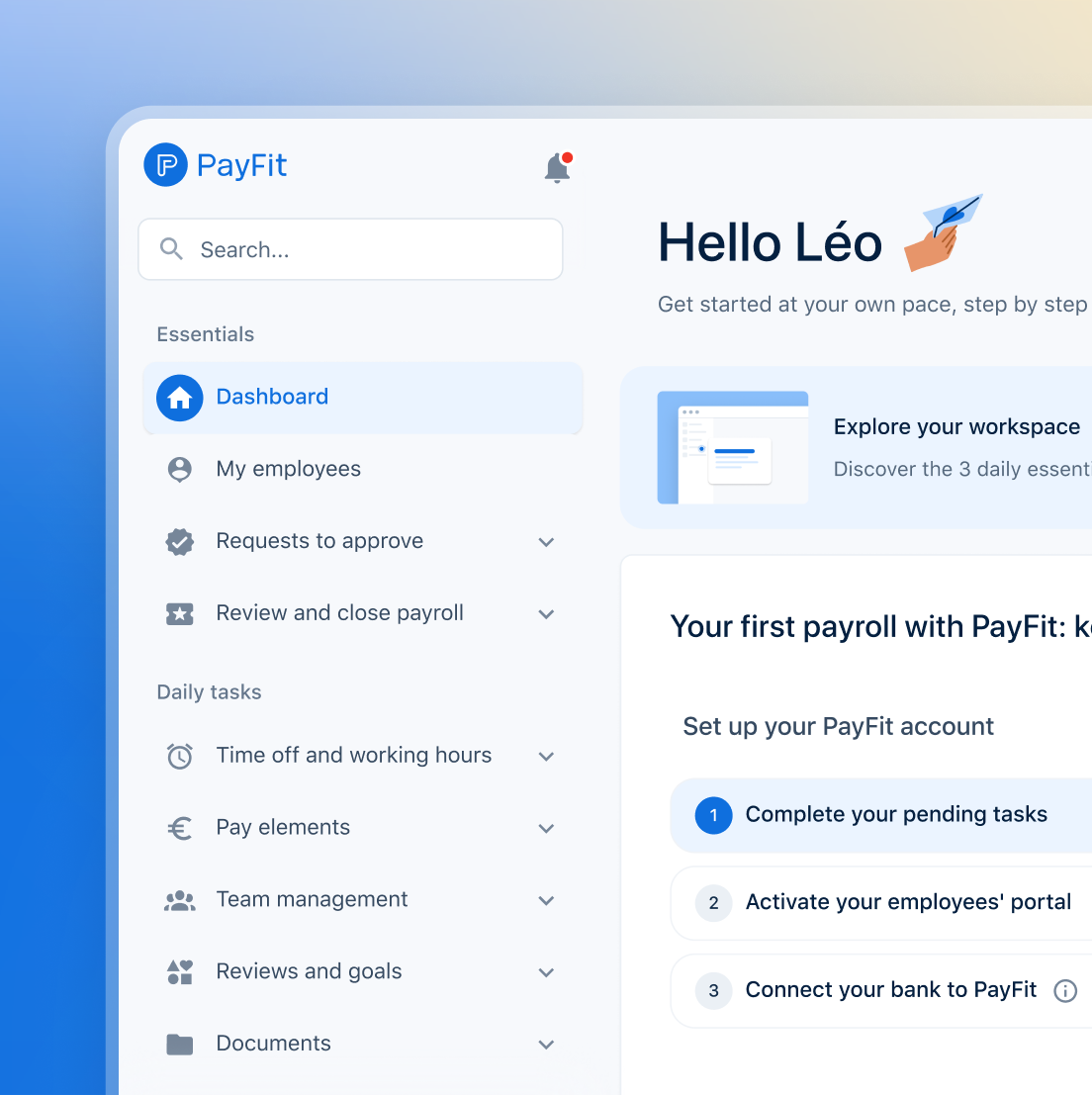✨ Health insurance, now in PayFit - learn more
💷 All the rates & thresholds you need to know for 25/26...right here
✨ The Payroll Journey: Start, Scale & Succeed Globally - learn more
✨ Health insurance, now in PayFit - learn more
💷 All the rates & thresholds you need to know for 25/26...right here
✨ The Payroll Journey: Start, Scale & Succeed Globally - learn more

Employee appraisals. They’re more than just a formality.
These regular reviews, typically conducted on an annual basis, offer line managers crucial time to discuss performance with team members, all while setting goals for the future.
It’s not just about evaluating performance. It’s about fostering a supportive dialogue that encourages development and growth. Transforming these sessions from stilted paint-by-number discussions into dynamic and empowering conversations should be the end game for any HR leader.
Let’s look at what an employee appraisal is in the UK and how to conduct one to ensure it’s not only effective but also genuinely inspiring. We’ll also go over some examples of what to say during an employee appraisal.
Also known as a work appraisal or performance review, the employee appraisal forms part of a wider performance management framework that includes shorter and more frequent touchpoints like one-to-ones. You can use a structured 1 on 1 meeting template to help keep these check-ins consistent and productive.
Think of it as a structured ‘heart-to-heart’ where a line manager and their direct report sit down to discuss performance over a set period of time (e.g. over a quarter or the past year). The discussion should be open and honest and centre around reviewing an individual staff member's contributions. Evidence should be stressed rather than opinion. And, of course, it’s a good time to dole out praise, set long-term goals and hone in on areas for improvement.
While you don’t need to conduct performance appraisals from a legal standpoint here in the UK, it’s widely regarded as best practice. Appraisals at work help set the tone around equality and fairness by providing a non-biased setting for feedback.
A staff appraisal should be a dialogue, not a monologue. It’s about listening as much as it is about providing feedback. Managers should be prepared to ask open and inquisitive questions and actively listen, while employees should come prepared to discuss achievements, future aspirations, and any obstacles they might face.
Payroll software guide
The secret to conducting a successful appraisal in the UK? Make it a positive, inclusive experience. Here’s how you can make the most of this opportunity to boost engagement and productivity.
Here’s a step-by-step guide for conducting appraisals that are both compliant and compassionate:
Approach the appraisal with a clear, organised structure. You can use our employee appraisal template to help guide the conversation.
Gather insights on all key performance indicators, 360 feedback, and any self-assessments so you can recall these during the meeting.
A performance review should never come as a surprise. Give staff members sufficient time to prepare; two weeks is usually considered a fair amount of notice.
Ideally, you should do this in advance. Send employees a questionnaire to fill out so they can start reflecting on their strengths, aspirations and growing edges. Remember, these don’t have to be the core focus - they should simply provide a jumping-off point for further discussion.
Through our performance management module, we offer several customisable performance review templates for everything from annual reviews to exit interviews.
Choose a setting that’s private and quiet, where managers and employees can talk without interruption. The right atmosphere can set the stage for the best dialogue.
An employee appraisal shouldn’t feel different from any other one-to-one. Encourage managers to take a relaxed approach and open up the floor for a genuine exchange. You can have them start by asking how the team member is doing with a positive frame, focusing on what they’ve done well and accomplished over the past quarters or years.
Offering them something like tea and biscuits can be a nice touch and a helpful way to help employees feel more relaxed and at ease!
You can then move on to areas that need improvement. Here, try to let the employee lead and reflect on their own growing edges. Questions like: ‘What could you have done differently?’ are a nice prompt here.
We’re talking ideas for additional training and opportunities for learning and development. Here again, it’s important to engage the employee proactively and encourage them to come up with their own ideas.
Active listening can transform the appraisal into a truly interactive experience. This is the time for managers to really hear their employee’s input about their experiences, challenges, and goals.
That is, those that are Specific, Measurable, Achievable, Relevant and Time-based. This can help your employees monitor their own progress.
An employee appraisal is also a good time to discuss salary and advancement opportunities - so don’t feel like you have to shy away from this! Use your overall compensation framework as a guide to come up with an agreement that makes sense for both parties.
Ideally, in a document you can share with your employee, which they can access and review in their own time. You’ll want to agree on any actions you’ve decided to take together and outline next steps clearly.
Schedule regular check-ins to revisit goals and discuss progress. This shows that you are invested in their continuous growth.
That way, the employee comes to appreciate their professional development as a continuous process.
Good appraisals are like good stories. They highlight the peaks, acknowledge the troughs, and always end with a forward-looking statement.
You might say, “Your innovative approach on project X brought us ahead of schedule, showing your strong initiative. Building on your client communication skills could enhance your project leadership even further.”
Avoid making it personal. Employee appraisal comments that are overly critical or lack constructive guidance will get you nowhere. Focus on behaviours that link to outcomes instead of personality traits.
Replace: “You seem disorganised”, with:
“Let’s explore ways to enhance your project management skills to increase efficiency.”
If you or your line managers are wondering, “what is a good sentence for an appraisal?”, here are some examples of how to frame questions and feedback. Effective appraisal comments are clear and future-focused:
Employee appraisal example phrases:
“You’ve shown great adaptability this year, and continuing to strengthen your data analysis skills could provide even more value to the team.”
"I've noticed some deadlines weren't met, and I'd love to understand how we can work together to improve this."
This is more helpful than commenting on a perceived lack of effort.
With thoughtful preparation and a commitment to genuine dialogue, employee appraisals can significantly enhance motivation and performance. They are not just a tool for evaluation but an opportunity for meaningful engagement that can lead to lasting growth and satisfaction.
Looking for a fuss-free way to manage small business performance reviews? Our performance management module is it:
Create and run performance reviews in a flash - Define and assign participants, choose a timeframe, then launch and monitor your campaign. Our pre-built performance review templates are easy to customise, or you can build your own from scratch.
Connect to employee portals and data - Pull data from the employee directory to cut down on data entry. Reviews are made easily accessible for staff through their individual employee portals.
Stay on track with notifications and reminders - Keep tabs on your campaign with invitations, notifications and reminders, ensuring all participants move through each step in a timely manner. You can keep track of all this from the main dashboard.
Want to see PayFit’s performance review module in action? Sign up to one of our tailored demos.


Learn what an employee performance evaluation is, what to include, how to run effective reviews, and how to turn feedback into real improvement.

Corporate wellbeing programmes can support employee health, reduce stress and improve engagement. Learn what to include, how to launch, and which initiatives work best.

2026 strategic guide for UK finance and HR leaders on running effective employment engagement surveys, with top questions, methods & software solutions.

Employee performance management tools streamline reviews, goal tracking and feedback. Discover features, benefits and top UK options for small businesses.

Read our guide to performance appraisals, from their definition and purpose through to best practices and available tools for UK companies.

Employee Assistance Programmes can be a valuable tool for HR leaders to provide support and advice for employees. Find out about them here.

See what's new in PayFit
New features to save you time and give you back control. Watch now to see what's possible